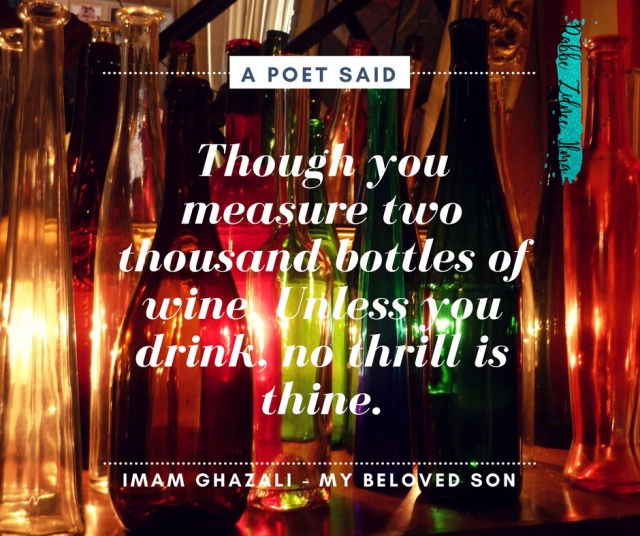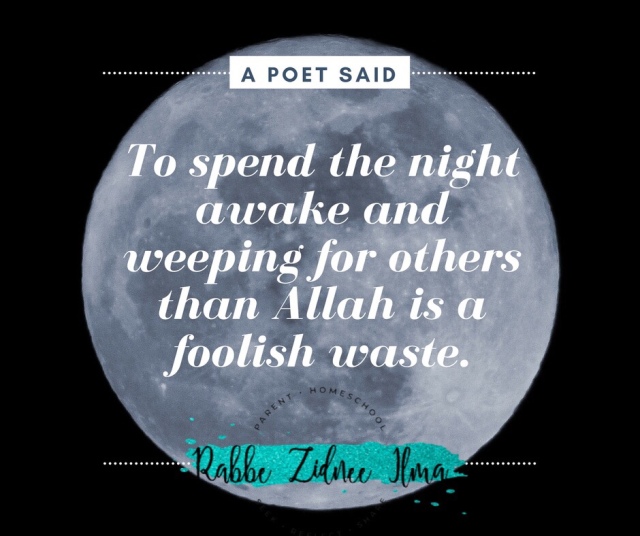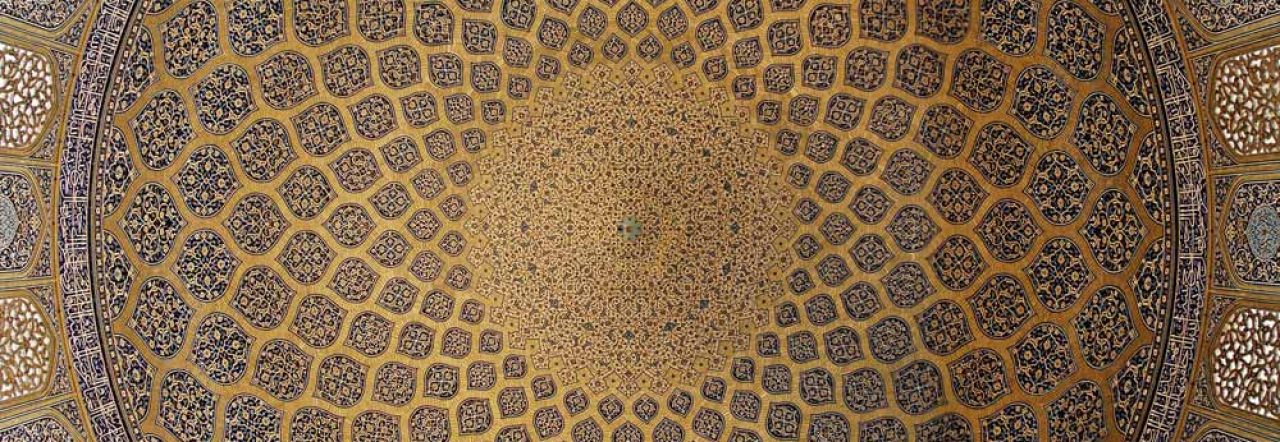The following advices were summarised and given by Imam Ghazali (rahimullah) to one of his students. He had been studying under the Imam for several years but became perturbed as to which branches of knowledge would be the most beneficial to him by way of illuminating his grave and honouring him on the Day of Judgement. The Imam responded in the form of a letter, with twenty-four counsels of which the first six are included here. They were especially relevant to the youth in question but are equally applicable and invaluable to each and every one of us today.
First Counsel – Revelation
“My dear son…
May Allah grant you a long life as His obedient servant and may He place you in His service alone. May Allah guide you to the right path of those who love Him and are loved by Him.
Know, my son, that real advice should be sought in the Revelation and the Sunnah of Muhammad ﷺ. If you have attained advice from it, what need have you of my advice? And if not, then tell me what you have attained in these past years?”
This summarises that the real purpose of our lives is only to worship and know our Creator – Allah. Imam Ghazali makes beautiful supplications for his student asking Allah to draw him close to the extent that he is only concerned with gaining the pleasure of his Lord through spiritual works, i.e Prayer, Quran, Hadith. He emphasises that the source of all counsels is in reality the existence and life of Prophet Muhammad ﷺ himself and thus based on his Sunnah and Hadith. These detail both one’s outward character and inner state which in turn prescribes how we should behave and conduct ourselves in all aspects of our life.
 If we follow in the footsteps of Muhammad ﷺ then we will be loved by Allah as he is the one who is the most beloved to Allah and Allah confirms this in the Quran: “Say to them, ‘If you love God, follow me and God will love you.'” (Quran 3:31) Therefore, if we take lessons from the life of the Prophet ﷺ then we will be successful – on the true path to salvation and we are not in need of any other instruction but if we neglect this exemplary role model who has been sent to us as a mercy then we will be a failure; our years having been lost and our knowledge futile. At this point we should examine and take account of ourselves so that we may be amongst those who are successful in both the this world and the next InshaAllah. Ameen.
If we follow in the footsteps of Muhammad ﷺ then we will be loved by Allah as he is the one who is the most beloved to Allah and Allah confirms this in the Quran: “Say to them, ‘If you love God, follow me and God will love you.'” (Quran 3:31) Therefore, if we take lessons from the life of the Prophet ﷺ then we will be successful – on the true path to salvation and we are not in need of any other instruction but if we neglect this exemplary role model who has been sent to us as a mercy then we will be a failure; our years having been lost and our knowledge futile. At this point we should examine and take account of ourselves so that we may be amongst those who are successful in both the this world and the next InshaAllah. Ameen.
Second Counsel – Time
“My dear son…
Among the many pieces of advice which Muhammad ﷺ gave to the Muslims was the following:
“The sign that Allah has turned away from His worshipper is his busying himself in that what does not concern him; and if a man has passed an hour of his life in other than for which he was created, it is certainly fitting that his grief should be prolonged on the Day of Resurrection, and whosoever has reached the age of forty, and his good does not surpass his evil, let him prepare for the Fire.”
This piece of advice should suffice the people of knowledge.”
There are three key points to reflect on in this counsel. The first is that we should not become preoccupied and engaged with matters which are not our business, i.e. idle talk, telling tales and so on as this will cause us to become detached and distant from Allah, devoid of the desire and longing to behold Him and what greater loss can there be? If one continues on this path then the vicious cycle of being unresponsive, unrepentant and unthankful will lead to the development of a dark stain in the heart and ultimately one’s own destruction.
 One way to check our final status with the Creator is by considering the words of Prophet Muhammad ﷺ, “Whoever wants to know what Allah has prepared for him, should look to what he has prepared for Allah.” With these words in mind, we should prioritise our time and life choices in terms of their degrees of relevance and responsibility. Primarily, by fulfilling our individual obligations to Allah and honouring the rights of those who we are responsible for. In this way one will perfect and complete one’s faith such that good deeds are multiplied exponentially in weight and value, drawing one closer to Allah. InshaAllah.
One way to check our final status with the Creator is by considering the words of Prophet Muhammad ﷺ, “Whoever wants to know what Allah has prepared for him, should look to what he has prepared for Allah.” With these words in mind, we should prioritise our time and life choices in terms of their degrees of relevance and responsibility. Primarily, by fulfilling our individual obligations to Allah and honouring the rights of those who we are responsible for. In this way one will perfect and complete one’s faith such that good deeds are multiplied exponentially in weight and value, drawing one closer to Allah. InshaAllah.
Man has only been created for one purpose which is to worship Allah and this should be the central point around which a believer leads and plans his life. He mentions forty, which is the age of intellectual maturity and wisdom with Prophets having received revelation, as being a turning point in ones life. The phase of youth comes to an end and the apparent realisation of the temporary nature of life should cause one to reflect deeply at their internal and external state and look to what they have achieved in terms of their deeds and standing with Allah. Umar (RA) said, “Take account of yourselves before you are taken to account, weigh your deeds before they are weighed.”
This complements the Imams advice that our day should be planned and organised to the extent that not a single hour is wasted on anything other than the worship of Allah as this would justify a long and painful Judgement and ultimately an abode in the fire. May Allah protect us. Ameen. Time is our most precious commodity and the consequences of squandering it would constitute grave ingratitude towards our Creator who says: “The son of Adam abuses me. He curses time and I am time, for in my hand are the night and day.”
Third Counsel – Knowledge
“My dear son…
To advise others is an easy matter, the difficulty is accepting advice, since it is bitter for those who follow their own inclinations and desires. They love the forbidden from the depth of their hearts. This is more applicable to seekers of knowledge and students of learning, those of them who are busy in the grace of spirits and the benefits of this world.
They believe that mere abstract knowledge, without proper action, will rescue them. This is the belief of the philosophers. Praise and Glory be to Allah, the Greatest of all. They do not know this much, that when they acquire knowledge, if they do not work according to it, the indictment against them is certain. Muhammad ﷺ: “The person most severely punished on the Day of Judgment is the learned one who did not follow Allah’s guidance and did not benefit from his knowledge.”
It has been narrated that someone saw Al-Junayd (RA) after his death in a dream. Al-Junayd (RA) was asked: “What news do you have, Abul Qasim?” He replied: “Perished are the speeches and vanished are the allusions, nothing benefited us except the prostrations which we made in the middle of the night.”
The Imam begins by highlighting that most people are very quick to judge; identifying the faults of others and freely giving advice. On the contrary very few will actively search for and gracefully acknowledge their own shortcomings when they are presented to them. This was the habit of the Companions who would become overjoyed when somebody advised them. Umar (RA) said, “May Allah have mercy upon a person who gifted me my faults!” However, this is a difficult concept for those who are distanced from Allah and have deep-rooted attachments with the life of this world.
Maulana Rumi said, “If the thirsty drink water from a cup they will see Allah in it. Those who are not intoxicated by the love of Allah will only see their own faces in it” meaning that the one whose heart is filled with the love of anything other than Allah will never truly benefit from his circumstances as he is quite literally preoccupied by the matters of the world which become his idols whereas the one who has Allah in his heart and seeks Him through prayer and good deeds then Allah will also seek him – “A lover never seeks without being sought by his beloved.”
 This is particularly attributed to students on the path of knowledge, who in the process of learning may become predisposed and vulnerable to developing attachments to the world by means of seeking fame or wealth for their efforts as opposed to the pleasure of Allah. Imam Ghazali said, “Knowledge without action is madness and action without knowledge can’t be!” This is a clear warning that the two are in fact equally important and necessary. Without knowledge one will not be able to carry out his individual obligations or fulfil his rights, interactions and transactions and is therefore in danger. Actions are null and void if done in isolation without purpose and information.
This is particularly attributed to students on the path of knowledge, who in the process of learning may become predisposed and vulnerable to developing attachments to the world by means of seeking fame or wealth for their efforts as opposed to the pleasure of Allah. Imam Ghazali said, “Knowledge without action is madness and action without knowledge can’t be!” This is a clear warning that the two are in fact equally important and necessary. Without knowledge one will not be able to carry out his individual obligations or fulfil his rights, interactions and transactions and is therefore in danger. Actions are null and void if done in isolation without purpose and information.
On the converse if one has knowledge and does not act upon it then rather than being beneficial, it will be detrimental and be a proof against him. Ibn Jawzee said: “The true impoverished person is the one whose lifetime is lost in knowledge that he does not act upon. So he has missed out on the delights of the dunya and the treasures of the Hereafter. Thus he will come on the Last Day as a bankrupt person, along with having a strong proof against himself.” This is the greatest loss incurring severe punishment and the Prophet ﷺ supplicated against it. May Allah protect us. Ameen. “It is most hateful to Allah that you should say that which you do not do.” (Quran 61:3)
 The Imam ends with an example of one of the greatest scholars Junaid ibn Muhammad Abu al-Qasim al-Khazzaz al-Baghdadi (830-910 AD) who was asked what benefitted him after his death when he appeared in a dream. It wasn’t his wealth of knowledge, preaching and teaching or written works but in fact the action of secret prayer in the middle of the night which was between him and his Lord but as a manifestation of his knowledge being implemented from his mind into his heart and limbs. This leads us to the conclusion that Ali (RA) made when he stated, “Knowledge calls out for action, if it is answered it stays, otherwise it departs.”
The Imam ends with an example of one of the greatest scholars Junaid ibn Muhammad Abu al-Qasim al-Khazzaz al-Baghdadi (830-910 AD) who was asked what benefitted him after his death when he appeared in a dream. It wasn’t his wealth of knowledge, preaching and teaching or written works but in fact the action of secret prayer in the middle of the night which was between him and his Lord but as a manifestation of his knowledge being implemented from his mind into his heart and limbs. This leads us to the conclusion that Ali (RA) made when he stated, “Knowledge calls out for action, if it is answered it stays, otherwise it departs.”
Fourth Counsel – Allah’s Mercy
“My dear son…
Be not bankrupt of good deeds, nor void of spiritual status. Know for certain that abstract knowledge alone will neither increase you in power nor strengthen your situation. Likewise, if a brave warrior in possession of ten Indian swords and other weapons was alone in the wilderness, and a great ferocious lion attacked him, do you think the weapons could defend him if they were not used against the lion? It is well known that arms cannot defend people unless they are brought into use.
By the same principle, if a man read a hundred thousand scientific theories, they would be of no use to him if he did not try and apply them. Similarly, if a man suffering from fever and a kidney disorder, he should be treated with ginger and other plants. Without treatment no recovery is achieved.
A poet once said: “Though you measure two thousand bottles of wine. Unless you drink, no thrill is thine.”
If you studied a hundred years and collected a thousand books, you would not be prepared for the mercy of Allah the Exalted, except by action. Allah says:
“Man shall have nothing but what he strives for. (53:39)”
“Whosoever expects to meet his Lord, let him work righteousness. (18:110)”
“A recompense for what they used to do. (9:82)”
“As for those who believe and do good work, they will have for them the gardens of Paradise as an abode. No change will they desire from them. (18:107)”
“Except he who repents, believes and does good work. (25:70)”
The Prophet of Allah ﷺ also said: “Islam is built on five pillars: testifying that there is no deity but Allah and that Muhammad is the Messenger of Allah, establishing the prayer, paying the zakah, fasting in Ramadan and performing hajj of the sacred house for those able to do so.”
Iman (faith) is confession with the tongue and belief with the heart and performance of the pillars of Islam. There are countless proofs on the necessity of actions; this is despite the fact that the servant shall attain Paradise by the grace and favour of Allah the Exalted, but such grace follows the servant’s readiness to obey and worship Him. Verily the mercy of Allah is very close to the doers of good.
It may be said that the slave may reach that status through faith alone. We say ‘Yes’, but when will he be able to reach it? How many obstacles will he be faced with? The first of these obstacles is the ravine of Iman and who is secure enough to guarantee that he will not lose his Iman? And if a man loses his Iman, he will be bankrupt and be dismayed in the Hereafter. Hasan Al-Basri (RA) said:”Allah will say to His slaves on the Day of Judgment: ‘Allow My slaves to enter Paradise by My Mercy and divide it amongst them according to their deeds.”
The Imam repeatedly emphasises using various examples that our physical acts of worship are our power, strength and defence if we use them. We will not benefit by simply having and storing knowledge of them, rather we have to strive to apply the routines of worship to earn Allah’s pleasure. We must use our intellect and all the tools which have been made available at our disposal to concentrate our efforts on fulfilling our obligations so that we are recompensed for our good deeds by means of meeting our Lord and Jannah. InshaAllah. For one can not really taste or appreciate the sweetness of the faith until one practises, experiences and internalises the teachings as outlined by Muhammad ﷺ.
 This ties in with the Hadith Qudsi mentioned in Bukhari which beautifully summarises the relationship between Allah and his devoted servants. Allah states that the most beloved acts of worship are those which have been made incumbent upon a person such as Fardh Salah, fasting in Ramadhan and giving Zakah and these take precedence. Once these are established and sound a servant can draw even closer to Allah by voluntary acts of worship such as Nafl prayers, Sunnah fasts and Sadaqah leading to Allah’s love. At this point Allah’s love becomes manifest such that the servant does not hear, see or take action, whether by hand or foot except that it is Allah that is directing his choices towards good. Thus his supplications will be answered and he will be under Allah’s protection. This is the way to Allah’s Mercy by working righteousness.
This ties in with the Hadith Qudsi mentioned in Bukhari which beautifully summarises the relationship between Allah and his devoted servants. Allah states that the most beloved acts of worship are those which have been made incumbent upon a person such as Fardh Salah, fasting in Ramadhan and giving Zakah and these take precedence. Once these are established and sound a servant can draw even closer to Allah by voluntary acts of worship such as Nafl prayers, Sunnah fasts and Sadaqah leading to Allah’s love. At this point Allah’s love becomes manifest such that the servant does not hear, see or take action, whether by hand or foot except that it is Allah that is directing his choices towards good. Thus his supplications will be answered and he will be under Allah’s protection. This is the way to Allah’s Mercy by working righteousness.
 Furthermore nobody is promised or guaranteed that their faith will remain firm and sound until the end and it is our end that decides our final fate. Hence in order to strengthen and affirm faith it is necessary that one strikes a balance between the components of worship and devotional knowledge as they are equally important. This means engaging in spiritual works encompassing regular acts of worship as outlined by the pillars of Islam, recitation of the Quran and study of its commentary alongside study of the Hadith for the sole purpose of seeking Allah. Ultimately this combination of devotional knowledge and spiritual application will lead to acceptance and certitude of faith to a point where it will be like an unshakeable deeply-rooted tree bearing lots of fruits in its high branches.
Furthermore nobody is promised or guaranteed that their faith will remain firm and sound until the end and it is our end that decides our final fate. Hence in order to strengthen and affirm faith it is necessary that one strikes a balance between the components of worship and devotional knowledge as they are equally important. This means engaging in spiritual works encompassing regular acts of worship as outlined by the pillars of Islam, recitation of the Quran and study of its commentary alongside study of the Hadith for the sole purpose of seeking Allah. Ultimately this combination of devotional knowledge and spiritual application will lead to acceptance and certitude of faith to a point where it will be like an unshakeable deeply-rooted tree bearing lots of fruits in its high branches.
The Quran gives a beautiful metaphor in Surah Ibrahim, to describe this process: “Have you not considered how Allah presents an example, making a good word like a good tree, whose root is firmly fixed and its branches high in the sky?” (Quran 14:24) The seed of faith placed in the chest needs to be consistently nursed, nurtured and cultivated with water, nutrients, sufficient light and air, in a gradual manner so that both the tree and individual can bloom until completion and perfection. This requires a carefully balanced approach in both the methods and composition of cultivation accompanied with hard work to ensure success. In this way the tree will become deeply-rooted, firmly planted, resisting external pressures and with branches stretching loftily into the sky. Similiarly a person who has nurtured his faith correctly will have iman deeply rooted in the soil of the heart without being shaken by confusions; bearing an abundance of fruits in the branches of faith, by Allah’s bounty.

Fifth Counsel – Evaluation
“My dear son…
He who does not work shall have no reward. It is reported that a man of the Bani Israel worshipped Allah, the Exalted for seventy years. Allah intended to test him before the angels, so He sent him an angel to tell him that he did not merit Paradise even with this worship.
When the angel informed him of this the worshipper replied: “We are created for worship and we can but worship Him.” The angel returned saying: “O my God, you know best what he said.” Allah the Exalted said: “Since he did not turn away from worshipping us, then with grace we shall not turn away from him. O my Angels, bear witness that I have forgiven him.”
Muhammad ﷺ said: “Evaluate your works before you are asked to account for them. Weigh your works before you are evaluated.”
Ali (RA) said: “Those who think that they can achieve their aims without work are dreaming, and those who think that they will attain the goal through exertion alone are self-confident and consider themselves self-sufficient.”
Hasan Al-Basri (RA) said: “Seeking and demanding Paradise without actions is a sin from amongst the sins.” He also said: “The sign of attaining reality is in giving up regard for work, not in giving up the work.”
Muhammad ﷺ said: “The wise man is he who judges himself and works for what is after death, and the fool is he who pursues his desires and vainly longs for Allah, the Exalted.”
The Imam considers a few points under the umbrella of evaluation. The first is that gaining the pleasure and forgiveness of Allah and hence paradise is only through effort, striving and remaining consistently steadfast in the way and worship of Allah. Secondly we should constantly reflect on the quality and quantity of our deeds and actions before they are Judged by the Almighty Allah.
In this way we can assess our intentions, methods, outcomes and goals on an intimate level and allow for personal development. Allah says, “He who created death and life to test you as to which of you is best in deed – and He is the Exalted in Might, the Forgiving.” (Quran 67:2) which emphasises that it is not how much good deeds you do but the ‘best’ of them meaning in quality and sincerity. It has also been said that a moment of true reflection is better than one thousand years of worship.
 An intellectual person is one who is able to strike a very fine balance and finds a middle path where he is able to work in the world but for that which will ultimately benefit him in the Hereafter. He realises that true success lies in working to the best of one’s ability but not allowing it to become the end-result. Rather it is a means to an end. May Allah grant us success. Ameen.
An intellectual person is one who is able to strike a very fine balance and finds a middle path where he is able to work in the world but for that which will ultimately benefit him in the Hereafter. He realises that true success lies in working to the best of one’s ability but not allowing it to become the end-result. Rather it is a means to an end. May Allah grant us success. Ameen.
The unfortunate one is he who considers that he will secure paradise without any effort or action and similarly the one who thinks that mere works in isolation will achieve this objective. In the case of the former he will become complacent and neglectful and in the case of the latter, he develops a false sense of self-sufficiency and arrogance which both lead to them becoming distant from Allah.
Sixth Counsel – Intention
“My dear son…
How many nights you have remained awake seeking knowledge and reading books, forbidding yourself the pleasure of sleep? I do not know for what purpose you did this.
If it was for attaining worldly benefits and securing its vanities, its status and position and asserting your superiority over your peers and brothers, then woe to you and again woe!
But if your purpose was to revive the Shariah of Muhammad ﷺ and to train your character, and break the Nafs Al-Ammarah (the soul commanding to evil), then blessed are you and again blessed.
The poet spoke truly when he said: “To spend the night awake and weeping for others than Allah is a foolish waste.”
This counsel emphasis that knowledge is of praiseworthy and blameworthy types. Praiseworthy knowledge is that which is sought with sincerity and for the purpose of acting upon it and benefitting others. It is done solely for the sake of learning about and gaining closeness to Allah and will thus bring about a state of humility and humbleness in a believer accompanied with an awe and reverence of Allah.
Blameworthy knowledge is that which is sought for any other purpose or intention such as fame, wealth or power. It will be fruitless and only increase one in arrogance, pride and ostentation and thus argumentation and quarrelling. This concept is reiterated by Malik ibn Dinaar (RA), “Truly if the slave seeks knowledge for action, his knowledge will humble him and if he seeks it for other than this then he will only increase in evil and pride.”
 Imam Abdullah Al-Haddad beautifully explains the correct intentions for seeking knowledge, “All praise to God, Lord of the Worlds. And salutations and greetings upon our Master Muhammad ﷺ and upon his family and companions. I intend to study and teach, take and give a reminder, take and give benefit, take and give advantage, to encourage the holding fast to the book of God and the way of His Messenger ﷺ, and calling to guidance and directing towards good, hoping for the countenance of God and His pleasure, proximity and reward, transcendent is He.”
Imam Abdullah Al-Haddad beautifully explains the correct intentions for seeking knowledge, “All praise to God, Lord of the Worlds. And salutations and greetings upon our Master Muhammad ﷺ and upon his family and companions. I intend to study and teach, take and give a reminder, take and give benefit, take and give advantage, to encourage the holding fast to the book of God and the way of His Messenger ﷺ, and calling to guidance and directing towards good, hoping for the countenance of God and His pleasure, proximity and reward, transcendent is He.”
And Allah knows best. Finally – Any good within this post is from Allah the Most High and any mistakes are from myself. May He forgive and accept it from me and have mercy on the esteemed Imam Ghazali (rahimullah) for his service to the religion. May he grant us guidance, divine facilitation and enable us to implement these counsels within our lives. Ameen.

